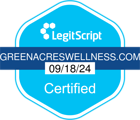Georgia Fentanyl Addiction Treatment
Fentanyl addiction is a nationwide crisis with devastating consequences. If you or a loved one is struggling with Fentanyl addiction, seeking professional treatment is essential to overcome this disease and achieve lasting recovery.
Overcoming fentanyl addiction requires specialized treatment that addresses its unique challenges, including severe withdrawal symptoms and a high risk of overdose.
At Green Acres Wellness in Georgia, we offer fentanyl addiction treatment tailored to your specific needs. Our team of recovery specialists offers personalized, evidence-based therapies and medication-assisted treatment to support you as you work to overcome addiction. Our comprehensive approach to recovery addresses the underlying physical and psychological causes and consequences of addiction, empowering you to move toward lasting recovery.
For more information on our fentanyl treatment program in Georgia, call us at (229) 213-3363
What Is Fentanyl?
When illegally used, fentanyl is taken outright or mixed with other drugs, such as heroin and cocaine. It can be extremely dangerous because users often don’t know what they are taking, and the substance can be contaminated or unevenly distributed. It is not uncommon for people to overdose on fentanyl without any knowledge that they were ingesting it in the first place.
What makes fentanyl especially dangerous is its potency. Fentanyl is estimated to be 50 to 100 times more potent than morphine and 30 to 50 times more potent than heroin. These differences mean that even small amounts of fentanyl can lead to addiction and deadly overdose.
What Are the Effects of Fentanyl?
Short-Term Effects of Fentanyl
- Nausea and vomiting: Fentanyl can cause significant gastrointestinal distress, leading to stomach upset and vomiting in some individuals.
- Respiratory depression: One of the most dangerous effects of fentanyl is its ability to drastically reduce breathing rates, potentially leading to respiratory failure and even death.
- Confusion and disorientation: Mental confusion, lack of concentration, and memory issues are all common side effects of taking fentanyl.
- Reduced heart rate: Fentanyl slows down heart rate, which can lead to feelings of dizziness, fainting, or confusion.
- Sleepiness: Many users of fentanyl experience a sedative effect, causing them to feel extremely drowsy or fall asleep.
- Seizures and convulsions: High doses of fentanyl can induce seizures and convulsions, which can be life-threatening during an overdose.
- Constipation: Consistent use of fentanyl can cause constipation and other digestive issues.
Because of fentanyl’s high potency, you can become highly dependent or addicted in a short amount of time, with users experiencing withdrawal symptoms if they attempt to stop using the drug. Additionally, there is an extremely high risk of accidental overdose, as even small amounts of fentanyl can be lethal.
Long-Term Effects of Fentanyl
- Addiction: Fentanyl use can quickly lead to addiction, where users crave the drug and experience withdrawal symptoms if they do not take it consistently.
- Cognitive impairment: Long-term fentanyl use can cause memory loss, difficulty focusing, and difficulty problem-solving.
- Organ damage: Significant organ damage, such as liver failure and kidney damage, is possible when taking fentanyl over time.
- Respiratory problems: Severe respiratory problems such as chronic obstructive pulmonary disease (COPD) and asthma are common among longtime users of fentanyl.
- Cardiovascular damage: Fentanyl use can cause cardiovascular damage, increasing the risk of heart attacks or other heart-related issues.
- Depression and anxiety: Prolonged use of fentanyl can lead to depression and anxiety, potentially leading to more serious mental health disorders.
In addition to these physical and mental health effects, fentanyl addiction can result in significant personal, social, and economic difficulties. Users may find it challenging to maintain relationships, hold down a job, and/or meet day-to-day responsibilities, leading to financial and legal troubles.
How to Identify a Fentanyl Overdose
Identifying a fentanyl overdose could help you save someone’s life.
Here are some signs to look for:
- Bluish tint to nails and/or lips: When a person’s body is not getting enough oxygen due to slow breathing, their nails and lips may take on a bluish tint.
- Unresponsive to stimuli: A person who has overdosed on fentanyl may not respond to attempts to wake them up or to painful stimuli (such as being pinched).
- Non-existent or weak pulse: Fentanyl overdose can cause the heart rate to become dangerously slow or even stop.
- Slow or shallow breathing: Fentanyl overdose can slow down or stop a person’s breathing, leading to oxygen deprivation and potential brain damage.
- Inability to speak or make coherent sentences: Fentanyl overdose can impair a person’s ability to communicate or even stay conscious.
- Vomiting or unusual gurgling sounds: In some cases, fentanyl overdose can cause a person to vomit or make unusual gurgling sounds due to airway obstruction.
If you suspect someone has overdosed on fentanyl, it is vital to act quickly. It is better to err on the side of caution and seek emergency medical attention immediately. Remember, a fentanyl overdose is a medical emergency that requires urgent attention.
Treatment for Fentanyl Addiction
We offer a variety of fentanyl addiction treatments at Green Acres Wellness in Georgia. Depending on your unique situation and the specific care you need, we will develop a treatment plan to help you learn coping strategies, build confidence and self-love, and give you the medical care and tools you need to overcome addiction.
You have many treatment options at Green Acres Wellness:
- Detoxification involves medical supervision in a controlled environment to rid the body of fentanyl. This treatment reduces the severity of withdrawal symptoms and prepares patients for further treatment.
- Holistic Therapy takes a mind-body-spirit approach to treating fentanyl addiction. Holistic therapy sessions include various alternative therapies, such as yoga, pickleball, and art therapy. The benefits of holistic therapy include addressing co-occurring mental health disorders and providing patients with new coping mechanisms and healthy ways to manage stress.
- Inpatient Care involves round-the-clock care at a residential facility, providing 24/7 medical monitoring for patients undergoing fentanyl detoxification or withdrawal. Inpatient care can help patients recover from addiction in a safe and supportive environment.
- Individual and Group Therapy provide support for people struggling with fentanyl addiction. These help patients address underlying issues, cope with stress, and develop effective behavior-changing techniques through evidence-based therapies like Cognitive Behavioral Therapy (CBT) and Dialectical Behavioral Therapy (DBT). The main benefits include developing healthy behaviors and effectively managing stress and triggers.
- Cognitive Behavioral Therapy focuses on altering unhealthy thoughts and beliefs contributing to addiction and replacing them with new, positive thinking patterns. CBT can help you identify negative thoughts, feelings, and behaviors that lead to drug use.
- Dialectical Behavioral Therapy is a form of therapy that focuses on mindfulness, emotional regulation, distress tolerance, and interpersonal communication. DBT can help patients develop self-awareness and strategies to manage difficult emotions and improve impulse control. DBT is particularly useful in treating fentanyl addiction when the patient struggles with emotional instability.
- Dual Diagnosis refers to simultaneously treating co-occurring mental health disorders and substance addiction. People struggling with addiction are often diagnosed with other mental health disorders, such as anxiety, depression, or post-traumatic stress disorder. Treating these underlying issues is critical to achieving long-term recovery from fentanyl addiction.
- Medication-Assisted Treatment combines behavioral therapy with medications to help people recover from addiction. The drug is used to reduce the urge to use fentanyl and to alleviate withdrawal symptoms while providing a therapeutic intervention.
Frequently Asked Questions
How long does fentanyl addiction treatment at Green Acres Wellness typically last?
The duration of treatment for fentanyl addiction in Georgia varies depending on the individual's needs. Our programs at Green Acres Wellness range from 30 to 90 days or longer, with the option for extended care and aftercare support.
Is family involvement encouraged during fentanyl addiction treatment at Green Acres Wellness?
Family support can play a crucial role in the addiction recovery process. We encourage family involvement through educational sessions, family therapy, and workshops to help rebuild relationships and create a supportive environment for long-term recovery from the effects of fentanyl addiction.
Does Green Acres Wellness offer support for co-occurring mental health disorders alongside fentanyl addiction treatment?
Yes, we recognize the interconnected nature of fentanyl addiction and mental health disorders. Our integrated treatment approach addresses co-occurring disorders such as depression, anxiety, PTSD, and more, ensuring that our patients receive comprehensive care for all aspects of their well-being.
We want to help you begin a new chapter of your life in which you are free from addiction. Call us at (229) 213-3363 or contact us online for fentanyl treatment in Georgia.



Our Focus Is Your Recovery
Learn What Sets Green Acres Wellness Apart
Expertly Crafted Treatment Center
Our facility is situated on 9 acres of serene Georgia plains, providing a peaceful and therapeutic environment for individuals to begin their journey towards lasting recovery, surrounded by nature's healing power and our expert care team.
Compassionate Support & Transparency
We understand that the first step is the hardest, and we are here to make it easier by providing a safe and supportive environment that serves as a jumping-off point for individuals to begin their journey toward lasting recovery and growth.
Highly-Trained & Experienced Team
Our team is committed to a compassionate approach to lasting recovery, providing a safe and supportive environment where individuals can heal, grow, and rediscover their true selves with the help of our expert and caring staff.
Individualized Treatment Plans
At Green Acres Wellness, we believe in providing personalized care through individualized treatment plans that are tailored to meet the unique needs of each client, ensuring the highest chance of successful and lasting recovery.



